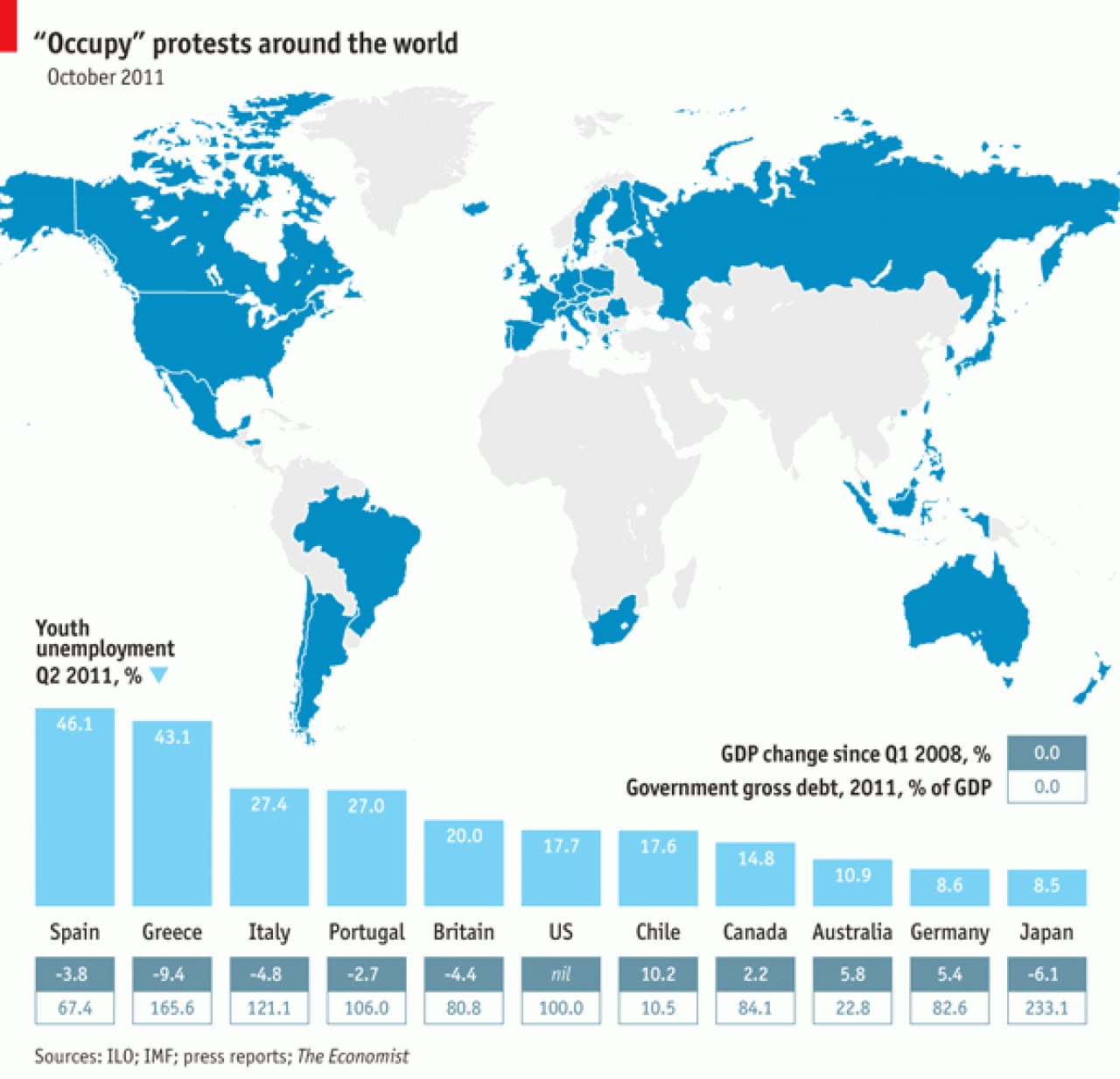I protested outside the World Economic Forum meeting in 2002. Here’s why activists should work with them today

Occupy was a social movement against the moneyed elite. Image: REUTERS/David McNew
It is of special significance to be writing for the World Economic Forum's Agenda because I was nearly arrested during an anarchist protest against the Forum’s 2002 gathering in New York City.
Running from the police that day was not my first act of protest. In fact, I have been an activist my entire life. I started creating activist campaigns when I was 13. Despite the many punishments that I received for being an activist, I persisted and one day, in 2011, I co-created Occupy Wall Street.
Occupy was a social movement against the moneyed elite. The movement’s protest encampments spread to 82 countries and nearly 1,000 cities. Back then, I was an editor at Adbusters, a radical anti-consumerist, anti-corporate magazine that was beloved on the activist edges of society. Occupy’s dissipation kicked off a wave of protest that continues in many different forms – including Black Lives Matter, March for Our Lives and Extinction Rebellion.
In other words, I’m an activist to the core and yet, here I am writing for the World Economic Forum. What ought an activist write in this situation?
Lately, I have been reflecting on why I am increasingly being approached on neutral, if not outright friendly terms by corporations, intergovernmental organizations and powerful elites that I once protested against.
My younger activist self would have said “no” outright, and without hesitation, to any conversation. I would have believed that nothing good could come from speaking to, or working with, elites.
Today, I’m more aware than ever that this kind of interaction is always a risk. Not only a reputational risk but also a risk that collaboration will lead to neutralization. So I tread lightly. Activists rightly fear being co-opted: the elite’s dinner table is the graveyard of passion for revolution.
It often doesn’t take long to discover that elites who approach activists are searching for the same thing: the mystery of social movement creation. As I wrote in a recent article for the OECD, powerful actors will need to demonstrate the capacity to create social movements if they wish to sustain their power and achieve their geopolitical agendas in the years ahead. That’s because, as the United States National Intelligence Council argues in its most recent Global Trends Report, the paradigm of power is changing:
“The most powerful actors of the future will be states, groups, and individuals who can leverage material capabilities, relationships, and information… [to] demonstrate power in outcome... by mobilizing large-scale constituencies of support, using information to persuade or manipulate societies and states to their causes.”
Activists, and their knowledge of how to mobilize everyday people into action from the bottom-up, are vital to elites. Do activists also need elites?
Elites need activists. Activists need elites
My younger activist self was right to never work with elites. That’s because, back when I was protesting outside the World Economic Forum’s meeting in 2002, the problems we faced as a human species were political. Activists, rightly so, believed that what was harming the world were a set of identifiable political decisions being made by specific organizations, heads of state and individuals. It made sense to adopt an adversarial posture towards the meetings we believed were creating those wrongful policies. Our protests demonstrated the conviction that, if this organization, or gathering of elites, were forced by activists to make different decisions, then the world would be a better place. And we were probably right.
Today, the landscape of power has shifted substantially and both activists and elites are being forced to adapt.
The most pressing problems facing humanity now are existential, not political. The climate emergency, and the globalization of crises, from killer AI to migration, impacts everyone -and the solution cannot come from one country, one president, one legislature or one movement.
Even if all the activists in the world worked together, we would still need the help of people we previously protested against. At the same time, even if all of the heads of state worked together, they would still need the help of activists in order to succeed.
Mobilising Action for Inclusive Societies
Existential threats require a scale of mobilization that can only be achieved through the active collaboration of the people with the powerful.
Activists who want to achieve their revolutionary agenda now need elites just as much as elites need activists. The adversarial relationship between activists and elites is no longer tenable – for now, at least – and a new relationship is called for. But what should that new relationship look like? How should elites and movements collaborate in a way that amplifies their ability to mobilize the world?
Above all, the risks of co-optation remain real. So what are the ways for activists to collaborate with elites? Is there anything elites can do to diminish the anti-revolutionary effect of their company, such that their spaces do not defang the social movements they wish to support?
The challenge
When activists and elites gather together it is not just the meeting of two forces previously in opposition. Above all, it is also the coming together of two distinct ways of wielding power.
The hope is that if these two different ways of mobilizing were to complement each other – one from the bottom-up and the other from the top-down – then great collective leaps could be accomplished.
Bringing these two types of power together is more difficult than simply hosting a plenary session. Social movements cannot be conjured at will, nor can they be bought or sold. Power and money cannot unlock the secret to social movement creation just as they cannot create a great piece of art. The people who join movements cannot be coerced into protesting or mobilizing – they are in the streets because the movement has awakened their spirit.
The power of elites is knowable, quantifiable and material. Activist power, on the contrary, is intuitive, unpredictable and subjective or spiritual more than material. It cannot be instrumentalized: even successful revolutionaries have been largely unable to “export” revolutions. To succeed in creating a collaborative social movement, elites must not treat activists as tools or resources.
What is the World Economic Forum’s Sustainable Development Impact summit?
The solution: co-creation not co-optation
I’m convinced that the solutions to the world’s biggest problems can only be solved through a collaboration between elites and activists. At the same time, I recognize that activists suffer from a reputational risk in their association with elites and that activism as a discipline is often unintelligible to elites because it is more of an art than a science.
A new relationship is needed if these two forces are going to work together effectively.
I believe the basis of that new relationship starts with reconceiving the role of plenaries, gatherings and meetings as a time for co-creating a movement. What if, when activists and elites got together, it was more like a hackathon than a summit?
Let’s use the resources of the World Economic Forum, along with the authenticity of activists, to bring together an interdisciplinary group of creative people who are tasked with inventing new global protest tactics - and launching a shared planetary movement towards solving the greatest challenges facing humanity.
Micah White is the author of The End of Protest and director of Activist Graduate School.
Don't miss any update on this topic
Create a free account and access your personalized content collection with our latest publications and analyses.
License and Republishing
World Economic Forum articles may be republished in accordance with the Creative Commons Attribution-NonCommercial-NoDerivatives 4.0 International Public License, and in accordance with our Terms of Use.
The views expressed in this article are those of the author alone and not the World Economic Forum.
Stay up to date:
Civic Participation
Related topics:
Forum Stories newsletter
Bringing you weekly curated insights and analysis on the global issues that matter.








